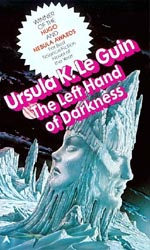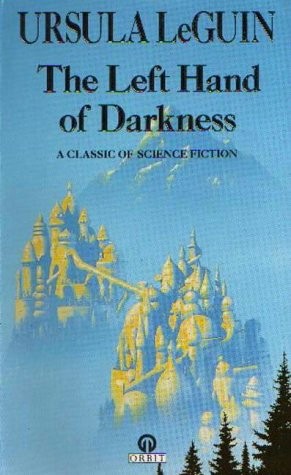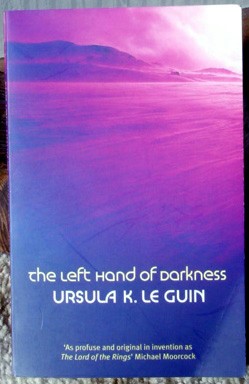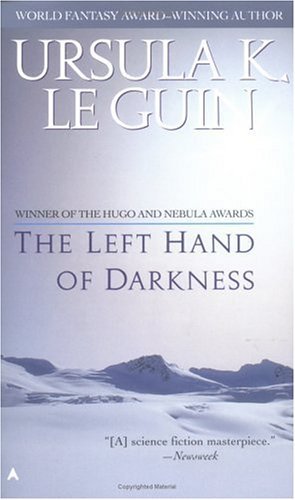



Home Characters Gethenian Sexuality Vocabulary Plot Homoeroticism in LHD Analysis Links Further Reading




Analysis
The most common criticism of The Left Hand of Darkness is that Le Guin's use of the pronoun “he” to modify her ambisexual Gethenians undermines the effect created by her androgynous aliens in the first place. Even Le Guin recognizes the folly of using male pronouns in her essay “Is Gender Necessary Redux” in which she states, “I still dislike invented pronouns, but I now dislike them less than the so-called generic pronoun he/him/his, which does in fact exclude women from discourse…” She also acknowledges her flaws in her characterization of the main Gethenians in her novel, particularly Estraven, who she notes she “cast . . . almost exclusively in roles that we are culturally conditioned to perceive of as ‘male’. . .” Despite Le Guin’s attempts to defy gender roles, she often reinforced rather than refuted them in her novel. The book contains an entire chapter on the equality inherent in a society in which all members are potential mothers, but we rarely see this equality expressed in the novel because it is narrated predominately by a male. The Gethenians are equal to one another, but to Ai, a manwoman might be a step above a typical woman, but he/she still falls below his opinion of men. Ai wants to see the Gethenians as men, because he respects men more and needs to establish mutual respect with the Gethenians in order to gain their trust. Yet sometimes the femininity in one of the Gethenian’s gestures or words makes their feminine nature blatantly obvious, filling Ai’s mind with revulsion: He notes that the guards are “effeminate—not in the sense of delicacy, etc., but in just the opposite sense: a gross, bland fleshiness, a bovinity without point or edge” (Le Guin 176). He is also sexually repulsed by the Gethenians, even when they are for all intents and purposes female. When a fellow prisoner in kemmer comes to him for sex he “got up and went to the window-slit as if for air and a look out, and did not come back to [his] place for a long time” (171). The interesting thing is that most often Ai’s encounters with effeminate Gethenians occur when the Gethenian is in or entering kemmer, further reinforcing the Gethenians own ideas that being in kemmer, or in a state of sexual attraction, causes one to be weak. In kemmer, the Gethenians need sex, they crave it, and Ai associates any kind of weakness as a feminine trait. However, he is in a permanent state of kemmer, so whereas the Gethenians are wracked with a sexual need for five days every 26 days, Ai can potentially be aroused at any time making him in fact weaker sexually then they are. Man’s weakness is often considered to be just that—his innate need for sex, yet Ai sees the Gethenian need for sex and sees it almost as animalistic and wrong. Ai’s ideas about Gethenian culture stem from his own cultural indoctrination, which is so similar to our indoctrination, and that of Le Guin herself.
Because of the preconceived gender roles of American society, Gethenians almost seem to become a human metro-sexual, transvestite, or gay man, rather than an androgynous being. Because our society is so consumed with gender identification, we are unable to see people as anything other than male or female. The lack of a universal pronoun is only the half of it, and it isn’t like a universal pronoun couldn’t benefit more than just feminist science fiction novels. Consider that at this point in time, there is no adequate term for a transvestite or a transgender individual. Do we call a drag queen “he” or “she” or “he/she”? All of these terms fail to describe this person’s identity, and we certainly cannot use “it”. This is one of the fundamentals of Le Guin’s thinking when she decided to use “he” to describe androgynes, but as she acknowledges in “Is Gender Necessary-Redux,” “If I had realized how the pronouns I used shaped, directed, controlled my own thinking, I might have been ‘cleverer.’” Because we already have a definite image of our minds of what is masculine and what is feminine, using a pronoun usually reserved for men inevitably conjures masculine images in the minds of readers. Le Guin needed to invent a pronoun, or defy the grammarians whom she accuses of making the generic them/they/their as a singular pronoun grammatically incorrect, and simply use they/them/there anyway, because as soon as she uses a gender specific word, the reader imagines a character of that particular gender.
Obviously, Le Guin attempts to compensate for her lack of an adequate pronoun by making directly contradictory statements, such as the one she is so proud of: “the king was pregnant.” This does in some ways highlight that androgynous nature, for who has ever heard of a landlady who sired children, or a king who bore them? Yet, rather than establishing the androgyny of the characters completely, these paradoxes highlight what we would consider a biological imperfection, something almost humorously wrong with them, like the movie Nine Months where Arnold Schwarzenegger has a baby. The problem with the novel as a whole is that because our society is so concerned with gender roles we spend the entire novel trying to figure out whether at a particular time a particular Gethenian is acting like a man or a woman.The whole point of the novel was to “eliminate gender to find out what was left” says Le Guin in “Is Gender …” and continues, “Whatever was left would be, presumably, simply human, It would define the area that is shared by men and women alike.” This is a noble idea and it is quite unfortunate that Le Guin was unable to create a society where we merely see humans as androgynes, rather than a feminine man, a masculine woman, or some sort of shape-shifter that is woman one moment, man the next, for, essentially, that is what a Gethenian in heat is like. Before he/she goes into kemmer, he/she has certain supposedly gender neutral characteristics, but upon entering kemmer, the hormonal imbalance will cause the Gethenian to suddenly morph into a specific sex.
Another problem with the book as a whole is the fact that the Gethenians are not able to simply engage in sexual relations without first developing a gender. This reinforces our notion of the necessity of gender, despite Le Guin’s assertion that the whole point of the book was to prove that gender is an unnecessary roadblock to equal human relationships. Ai becomes a mental androgyne, even though he is still physically male. The point seems to be that it is all about how one thinks of people of the opposite sex, but unless the author absolutely forces us to see her characters as without gender, we will continue to judge them based on gender just as we already judge others in our everyday life.
Pictures from Amazon.com.